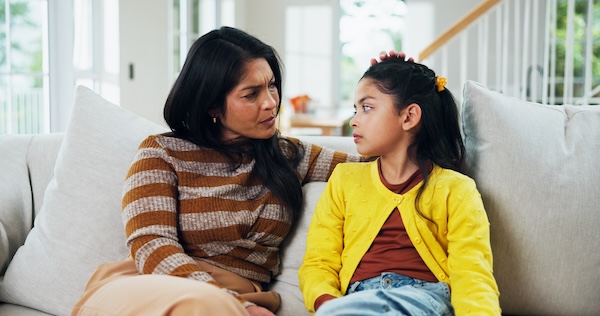Drag
Select
Call Now
How to talk to your child or teen about pornography
Kid
Parent
Teen

Hey parents, we know talking to your child about pornography is a highly uncomfortable topic, so rest assured that we’re here to help you every step of the way. And while it may be tempting to skip this subject altogether, trust us when we say that it’s really important to open up the conversation with your child or teen.
The truth is that in this digital age, online pornography is prevalent and easy to access. New research confirms that most teens surveyed have seen online pornography (including females — this isn’t just a topic for males!). The good news it that conversations with a trusted adult can point them toward healthy ways to explore their sexuality.
While your kiddo may not be actively seeking out pornography, or you may have the best digital parental controls out there, they will likely encounter pornography at some point during their childhood, with the likelihood increasing as they get older. Children may accidentally open a spam email or text, may type in a web address incorrectly, or may click on ads. They may also encounter porn while at a friend’s house, or they may seek it out themselves as they get older.
That’s why opening up the discussion now will help to prepare your children for what they may come across online and assure them that they can always come to you. By talking about pornography, you have the ability to remove shame or secrecy surrounding sexuality, pave the way for conversations surrounding consent, and create a trusting family atmosphere where everyone feels safe and understood.
Opening up the conversation surrounding pornography
It’s best to open up the conversation surrounding pornography sooner rather than later, but know that it’s never too late to start. As with all conversations surrounding sex, we recommend that you make this an ongoing, ever-evolving dialogue as your child grows up instead of making it one “big talk.”
We know that this can be a tough one to tackle, but try to check any shame at the door. It’s best to normalize sexual curiosity so that your child will know they can always come to you with questions or challenges, while also reassuring them that it’s okay if they feel awkward or embarrassed while talking about sex.
{{famcgteen="/blogcomponents"}}
Here are some age-appropriate tips to help you get started:
For talking to younger children
- Simply open up the conversation. It’s not necessary to go into specific detail about pornography with your young child, but a great place to start is by opening up the conversation surrounding anatomy, gender, online safety, and sex. Starting a dialogue from an early age will help to establish you, the caregiver, as the ultimate safe, go-to person on all things sex education. Plus, destigmatizing these topics will help to eliminate any shame, ensuring that your child will feel more comfortable turning to you in the future when they have questions about sex.
- Normalize healthy affection and discuss consent. You can talk to your child about the ways in which hugging and physical closeness can be a wonderful thing between two consenting people. Also, let them know that they are in charge of their bodies and no one should ever touch them without consent or violate their boundaries. You can teach them to respect other people and their feelings, laying the groundwork for future healthy relationships. You can say things like, “Did you know that your body belongs to you? And because it belongs to you, you get to say what happens to and with your body. Those body rules are called your body boundaries.”
- Put family digital boundaries into place. You can put the computer in a communal area for younger children and use internet-blocking programs or parental controls, but remember that no system is foolproof. If your child is online, it’s a good idea to say something like, “If you come upon a site that feels inappropriate, please tell me. You will not be in trouble, but it’s important for me to know to keep you safe.”
- Be there to talk through inappropriate content. Exposure to pornography can be upsetting for young children. If your child does stumble upon inappropriate content, try to use it as an opportunity to connect. You can say something like, “What you saw was made for adults and isn’t appropriate for kids. I’m sorry that you saw that, and we’ll work together to try to protect you from things that are for grown-ups. You can always come to me with questions about what you see online.”
For talking to older kids
- Identify your own values and beliefs. As with any tricky parenting topic, it’s important to identify your own values surrounding pornography before you dive into the conversation. You may have a strictly no-watching pornography stance, or you may encourage their curiosity. Every family is different, so you’ll need to communicate your expectations clearly and directly.
- Let your child or teen know that they aren’t in trouble. Introduce the conversation in a way that lets your child immediately know that they haven’t done anything wrong. You can start by saying something like, “I’ve been meaning to check in with you now that you have a computer in your room,” or “I think it’s important to talk about all of the things that can be online now that you have your own phone.” Bringing shame into the conversation will only cause them to shut down and will likely prevent them from coming to you in the future if they have questions surrounding sex.
- Remind them that pornography isn’t real life. While sexual curiosity and interest are a normal part of growing up, it’s important to let your child know that what they see online is not always real and often depicts unhealthy forms of sexual expression that can include violence and abuse. Diverse body types are often not represented, and contraception and consent are rarely a part of the narrative. The truth is that their future sexual experiences will likely not resemble the acting that they see in pornography — and that’s a positive thing!
- Explain the risks. You can compare looking at pornographic images to the addictive qualities of a slot machine. Both are designed to stimulate our brains and keep us coming back compulsively. That’s why it’s important to foster real-life intimacy, discuss consent often, and to create awareness surrounding all online activities. Pornography should not be a replacement for connection with others or used as a coping tool for loneliness.
- Reach out for support if you need it. It is quite normal for teens to be curious about porn, and curiosity alone is not a cause for great concern, but the negative impact that porn has on a developing mind can be. Therefore, keep the conversation going and step in if it begins to affect their relationships or other areas of their lives. Know that you can always call on the support of a mental health professional for support, especially if you suspect that your child is developing an unhealthy relationship with internet use. Every child is different, but red flags can include changes in mood, sleep patterns, school performance, or appetite.
Your child is so fortunate to have you as an advocate as they navigate growing up in a digital world. Most of us don’t have a blueprint for how to have these types of conversations, so grant yourself some grace as you go. It might not look perfect, but above all, just letting your child know that you’re there for them and that they can always come to you with anything will go a long way in helping them feel safe. We know that parenting is hard work, so remember that our team at Bend is here if you need support.




